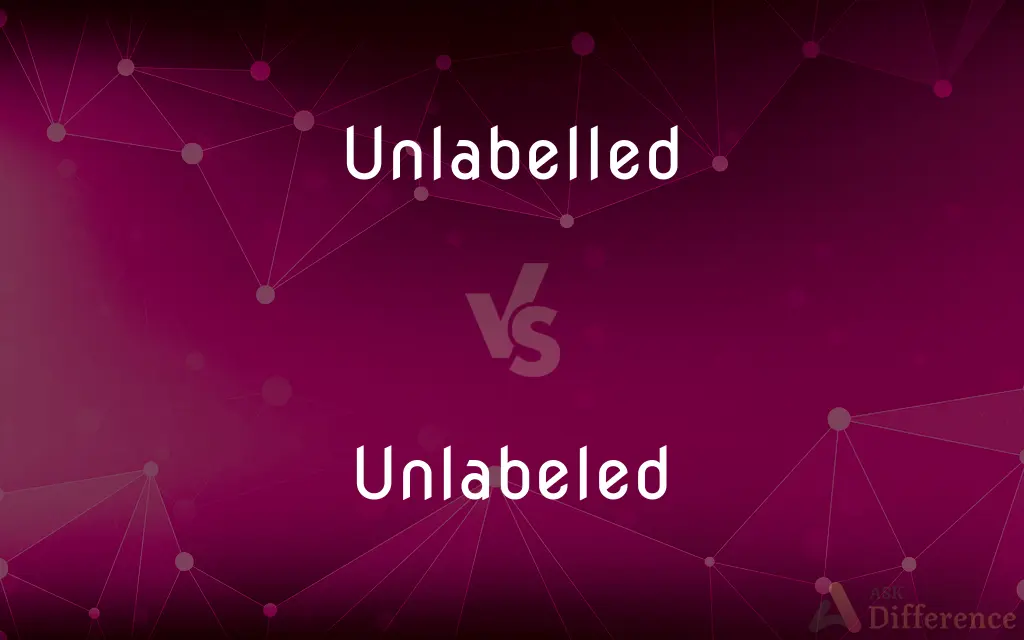Unlabelled vs. Unlabeled — What's the Difference?
By Fiza Rafique & Maham Liaqat — Updated on March 8, 2024
Unlabelled typically follows British English conventions, implying something lacks a label, while unlabeled is the American English variant with the same meaning.

Difference Between Unlabelled and Unlabeled
Table of Contents
ADVERTISEMENT
Key Differences
Unlabelled is commonly used in British English to describe objects or products that do not have a label, tag, or identification marker attached to them. Whereas, unlabeled is the preferred spelling in American English, though both terms convey the same concept of lacking labels.
In academic or technical contexts, unlabelled might be used in British publications, including scientific research or product descriptions, to indicate materials without labels. On the other hand, American journals and documents use unlabeled for the same purpose, reflecting the spelling preferences of each English dialect.
When it comes to digital content or data, unlabelled might describe data sets in machine learning that are not tagged with information or categorization in British contexts. Conversely, unlabeled is used in American English to refer to similar data sets, highlighting the consistency of spelling preferences across different types of content.
In consumer goods, an unlabelled product in the UK might lack information regarding its manufacturer, ingredients, or usage instructions. In contrast, an unlabeled product in the US would similarly lack such information, emphasizing the importance of regional spelling conventions even in common consumer contexts.
The choice between unlabelled and unlabeled can also reflect the writer's or publisher's adherence to either British or American English standards, impacting spelling in educational materials, books, and official communications without changing the term's fundamental meaning.
ADVERTISEMENT
Comparison Chart
Spelling Variance
Double "l"
Single "l"
Preferred Usage
British English
American English
Contexts of Use
Academia, consumer goods, digital data
Academia, consumer goods, digital data
Implication
Lacking a label
Lacking a label
Phonetic Spelling
/ʌnˈlɛb(ə)ld/
/ʌnˈleɪbəld/
Compare with Definitions
Unlabelled
Not having a label to identify content or origin.
The unlabelled bottle raised concerns about its contents.
Unlabeled
Absent of descriptive or informative tags.
Unlabeled files cluttered the database.
Unlabelled
Missing a descriptive or informative tag.
Unlabelled photographs were found in the old album.
Unlabeled
Not having a label indicating content or origin.
The unlabeled package arrived unexpectedly.
Unlabelled
Lacking classification or categorization.
Unlabelled data complicates the research process.
Unlabeled
Without classification, categorization.
Unlabeled samples posed a challenge for the lab team.
Unlabelled
Free from any markings or identifiers.
We found an unlabelled box in the attic.
Unlabeled
Lacking a brand or name indication.
Consumers often distrust unlabeled products.
Unlabelled
Without a brand or name indication.
The unlabelled clothing was cheaper but of unknown quality.
Unlabeled
Missing markings or identifiers.
An unlabeled disc was found inside the computer.
Unlabelled
(British spelling) Not labelled; having no label.
Unlabeled
(American spelling) Not labeled; having no label.
Unlabelled
Lacking a label or tag;
Unlabeled luggage is liable to be lost
Unlabeled
Lacking a label or tag;
Unlabeled luggage is liable to be lost
Common Curiosities
Do "unlabelled" and "unlabeled" have different meanings?
No, they share the same meaning but differ in spelling based on British and American English standards.
Is "unlabelled" incorrect in American English?
No, "unlabelled" is not incorrect but "unlabeled" is the preferred spelling in American English.
Is one spelling more correct than the other?
Neither is more correct; the choice depends on the regional spelling conventions being followed.
Can "unlabeled" be used in British English documents?
Yes, but "unlabelled" is more commonly used following British English conventions.
Are there any contexts where "unlabelled" or "unlabeled" should specifically be used?
The context doesn't necessarily dictate the use, but the choice between "unlabelled" and "unlabeled" should align with the overall language style of the document or publication, whether it adheres to British or American English standards.
How can I remember which spelling to use?
A helpful tip is to associate "unlabelled" with British English by remembering the extra "l" stands for "London" (a key city in the UK), and "unlabeled" with American English by noting the single "l" as in "Liberty" (symbolic of the US).
Will using "unlabeled" in a British English document be considered a spelling mistake?
While not technically a mistake, it might be flagged by editors or proofreaders who expect adherence to British English conventions, which prefer "unlabelled."
Can the choice of spelling impact the understanding of a text?
No, the understanding remains the same, though the choice of spelling can reflect the writer's adherence to either British or American English.
Can the use of either spelling variant impact academic or professional credibility?
Unlikely, as long as the chosen variant is consistent with the overall language preference (British vs. American English) of the document or publication. Consistency is key to maintaining credibility.
Does using one variant over the other affect search engine optimization (SEO)?
Potentially, yes. If your audience is primarily in the US, using "unlabeled" might align better with common searches, while "unlabelled" might be more effective for a UK-based audience. Understanding your target demographic can guide which variant to use.
Share Your Discovery

Previous Comparison
Sink vs. Sync
Next Comparison
Pollex vs. ThumbAuthor Spotlight
Written by
Fiza RafiqueFiza Rafique is a skilled content writer at AskDifference.com, where she meticulously refines and enhances written pieces. Drawing from her vast editorial expertise, Fiza ensures clarity, accuracy, and precision in every article. Passionate about language, she continually seeks to elevate the quality of content for readers worldwide.
Co-written by
Maham Liaqat















































